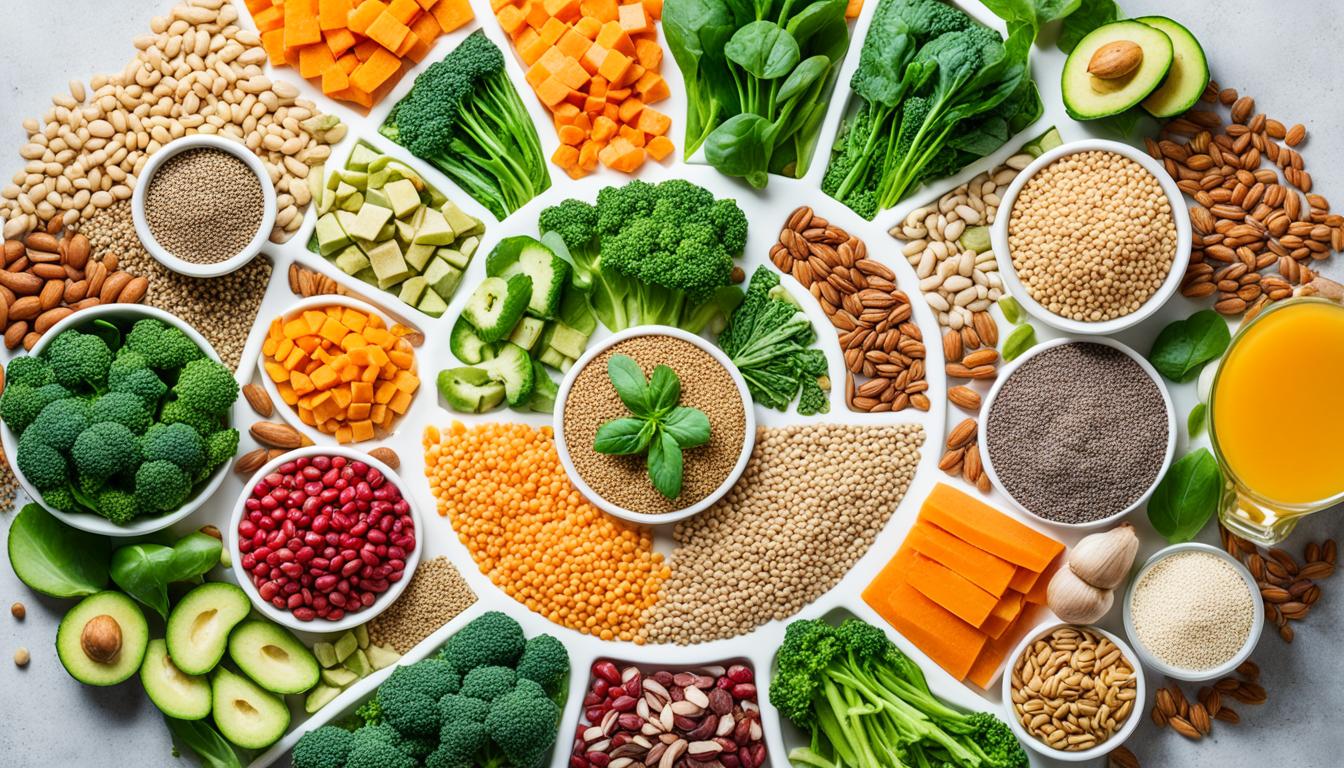Did you know that plant-based foods can be a rich source of protein, providing ample nutrition for a healthy and satisfying diet? Contrary to popular belief, you don’t need to rely solely on animal products to meet your protein needs. Plant-based foods are packed with protein, offering a wide range of options for vegetarians and vegans alike.
In this section, we will explore the best high protein plant based foods that you can incorporate into your diet. From soy products to beans, nuts, seeds, and vegetables, we’ll cover a variety of choices that will help you meet your protein requirements while enjoying delicious and nutritious meals.
Key Takeaways:
- Plant-based foods can provide ample protein for a healthy diet.
- There are numerous high protein options for vegetarians and vegans.
- From soy products to nuts and vegetables, you can find a variety of plant-based foods rich in protein.
- Incorporating these foods into your diet can help you meet your protein needs and enjoy a diverse range of meals.
- Plant-based protein sources offer numerous health benefits beyond just protein content.
Understanding Plant-Based Proteins
In this section, we will delve into the world of plant-based proteins. We will discuss the role of protein in a plant-based diet and its importance for overall health and well-being. We will also explain the difference between complete and incomplete proteins and provide examples of plant-based protein sources that are suitable for different dietary needs.
The Role of Protein in a Plant-Based Diet
Protein is an essential macronutrient that plays a crucial role in the growth, repair, and maintenance of our body’s tissues. It is made up of amino acids, which are the building blocks of life. In a plant-based diet, it is important to ensure that you are getting enough protein to meet your body’s needs.
Protein is responsible for various functions in the body, including:
- Building and repairing tissues
- Supporting the immune system
- Producing enzymes and hormones
- Transporting and storing nutrients
- Providing energy
By including plant-based protein sources in your diet, you can meet your protein needs while enjoying the numerous health benefits that come with a plant-based lifestyle.
Complete vs. Incomplete Proteins
Proteins are classified as complete or incomplete based on their amino acid profile. Complete proteins contain all nine essential amino acids that our bodies cannot produce on their own, while incomplete proteins lack one or more essential amino acids.
While animal-based protein sources are usually complete, plant-based protein sources can be combined to form complete proteins. For example, combining grains and legumes can create a complete protein profile.
However, it is not necessary to combine proteins at every meal to meet your amino acid needs. Consuming a varied plant-based diet over a day or week can ensure that you get all the essential amino acids your body needs.
Now, let’s explore some examples of plant-based protein sources that you can incorporate into your diet.
Plant-Based Protein Sources
When following a plant-based diet, there are numerous protein-rich options available to you. Here are four plant protein foods:
- Quinoa: This ancient grain is a complete protein source and is packed with essential amino acids. It is easy to cook and can be used as a substitute for rice or couscous in a variety of dishes.
- Lentils: These legumes are high in protein and fiber, making them a nutritious choice. They can be used in soups, stews, salads, and curries for a protein-packed meal.
- Chickpeas: Also known as garbanzo beans, chickpeas are a versatile protein source. They can be used to make hummus, added to salads or roasted for a snack.
- Tofu: Made from soybeans, tofu is a popular plant-based protein option. It can be marinated and grilled, stir-fried, or added to soups and stews for a protein boost.
These plant-based protein sources not only provide protein but also offer an array of other essential nutrients, such as fiber, vitamins, and minerals.
By incorporating these plant protein foods into your diet, you can enjoy the benefits of plant-based protein while supporting muscle building, overall health, and well-being.
The Powerhouse of Plant Protein: Soy Products
Soy products are known for being a powerhouse of plant protein. They are versatile, and nutritious, and can be a great addition to a vegetarian or vegan diet. In this section, we will explore different soy products such as tofu, tempeh, and edamame, and discuss their nutritional content and cooking ideas.
Tofu: Tofu is a popular soy product that is made by coagulating soy milk and then pressing the curds into blocks. It is a rich source of protein, with approximately 8 grams of protein per 100 grams (1). Tofu is also low in carbohydrates and contains essential amino acids. It has a mild flavor and a versatile texture, making it ideal for various cooking methods.
Tempeh: Tempeh is another soy product that is made by fermenting cooked soybeans. It has a hearty texture and a nutty flavor. Tempeh is rich in protein, with around 19 grams per 100 grams (2). It is also a good source of fiber, vitamins, and minerals. Tempeh can be grilled, baked, stir-fried, or used as a meat substitute in various dishes.
Edamame: Edamame are young soybeans that are typically harvested before they fully mature. They are often served as a snack or added to salads, stir-fries, or soups. Edamame is packed with protein, providing approximately 11 grams per 100 grams (3). They are also a good source of fiber and contain essential nutrients such as folate, vitamin C, and potassium.
Benefits of Soy Products
Soy products offer several health benefits. They are an excellent source of high-quality plant-based protein, making them a valuable addition to a vegetarian or vegan diet. Consuming soy products regularly may help improve heart health, lower cholesterol levels, and reduce the risk of certain chronic diseases. Additionally, soy products are rich in antioxidants, vitamins, minerals, and dietary fiber, all of which contribute to overall health and well-being.
It’s important to note that some individuals may have allergies or sensitivities to soy products. If you have any concerns or medical conditions, it’s best to consult with a healthcare professional or a registered dietitian before incorporating soy products into your diet.
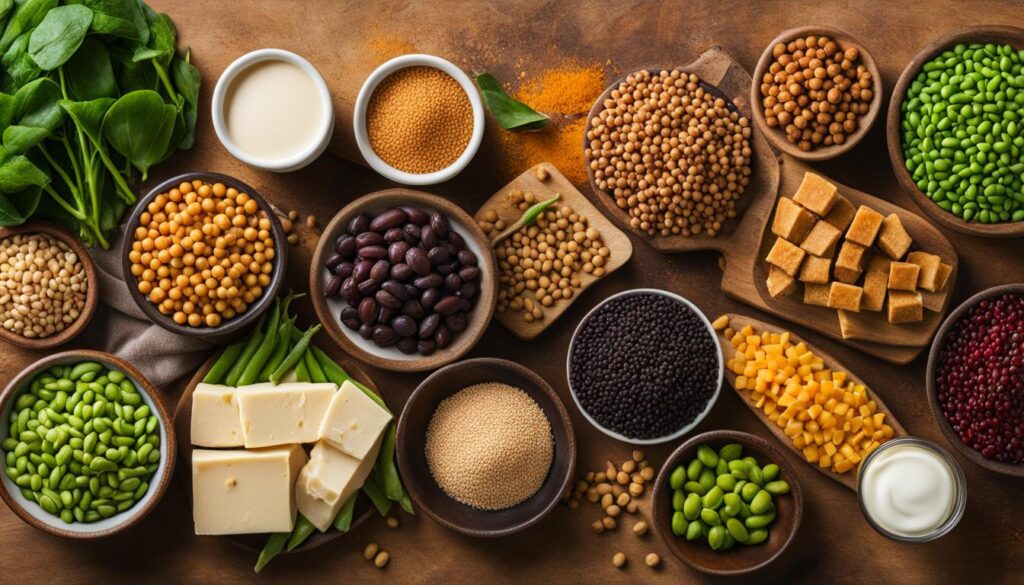
Rich and Hearty Beans: Versatile Protein Sources
Beans are a fantastic choice for vegetarians and vegans seeking high protein vegetarian foods for muscle building and overall nutrition. They are not only rich in protein but also packed with fiber, vitamins, and minerals. Two of the most popular types of beans are lentils and chickpeas, which offer a wide range of nutritional benefits and culinary possibilities.
Lentils: Nutrition and Cooking Ideas
Lentils are a powerhouse of plant-based protein, containing approximately 9 grams of protein per 100 grams. They are also high in complex carbohydrates, fiber, iron, and folate. Lentils come in various colors, including green, red, and black, each with its unique taste and texture. They are incredibly versatile and can be used in soups, stews, salads, and even veggie burgers.
To cook lentils, rinse them thoroughly and then bring them to a boil in a pot of water. Reduce the heat and simmer until they are tender, which usually takes around 15-20 minutes. Lentils can absorb flavors well, so feel free to add herbs, spices, and vegetables to enhance their taste.
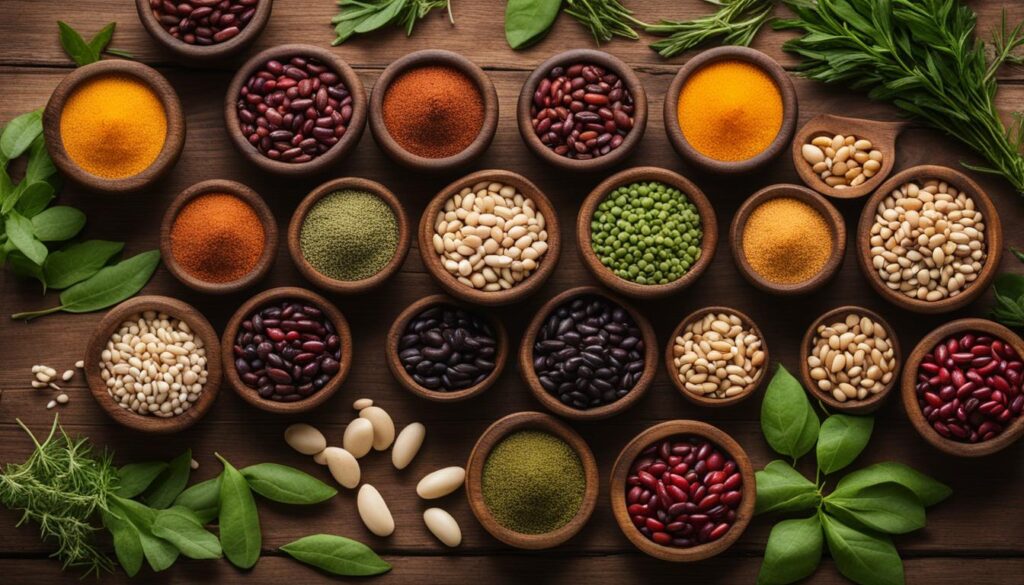
Chickpeas: More Than Just Hummus
Chickpeas, also known as garbanzo beans, are another excellent source of plant-based protein with approximately 19 grams of protein per 100 grams. They are rich in fiber, iron, folate, and manganese. Chickpeas have a nutty flavor and a slightly creamy texture, making them a versatile ingredient in various dishes.
While chickpeas are commonly used to make hummus, they can also be roasted for a crunchy snack, added to salads, or used as a base for vegetarian curries and stews. To cook chickpeas from scratch, soak them overnight, then simmer in water until they are soft and tender. Alternatively, canned chickpeas can be a convenient option for quick and easy meals.
Both lentils and chickpeas can be a nutritious and delicious addition to a high protein plant-based diet. Whether you’re trying to build muscle or simply looking to incorporate more vegetarian protein sources into your meals, these beans are an excellent choice.
Incorporating Nuts and Seeds into Your Diet for Protein
Nuts and seeds are not only delicious but also packed with protein. They are great options for vegetarians and vegans looking for plant-based sources of protein. In this section, we will explore different types of nuts and seeds that are high in protein, such as almonds, walnuts, chia seeds, and hemp seeds. Let’s take a closer look at their nutritional content, health benefits, and creative ways to incorporate them into your diet.
Almonds: Almonds are a fantastic source of plant-based protein. They contain approximately 21g of protein per 100g serving. They are also rich in healthy fats, fiber, vitamin E, and magnesium. Almonds can be enjoyed as a snack, added to salads, or used to make homemade almond milk.
Walnuts: Walnuts are another excellent choice for protein. With around 15g of protein per 100g serving, walnuts offer a good amount of plant-based protein. They are also high in omega-3 fatty acids, which are beneficial for heart health. Walnuts can be eaten on their own, added to baked goods, or sprinkled over salads.
Chia Seeds: Chia seeds are a tiny but mighty source of protein. With approximately 17g of protein per 100g serving, chia seeds are a powerhouse of nutrition. They are also packed with fiber, omega-3 fatty acids, and antioxidants. Chia seeds can be added to smoothies, sprinkled over yogurt or oatmeal, or used as an egg substitute in baking.
Hemp Seeds: Hemp seeds are known for their high protein content. They contain about 30g of protein per 100g serving, making them one of the best plant-based protein sources. Hemp seeds are also rich in omega-3 fatty acids and fiber. They can be sprinkled over salads, blended into smoothies, or used to make homemade protein bars.
To summarize, nuts and seeds are nutritious and versatile options for adding protein to your vegetarian or vegan diet. Whether you enjoy them as snacks, incorporate them into your meals, or use them in recipes, these plant-based sources of protein provide essential nutrients and support your muscle-building goals.
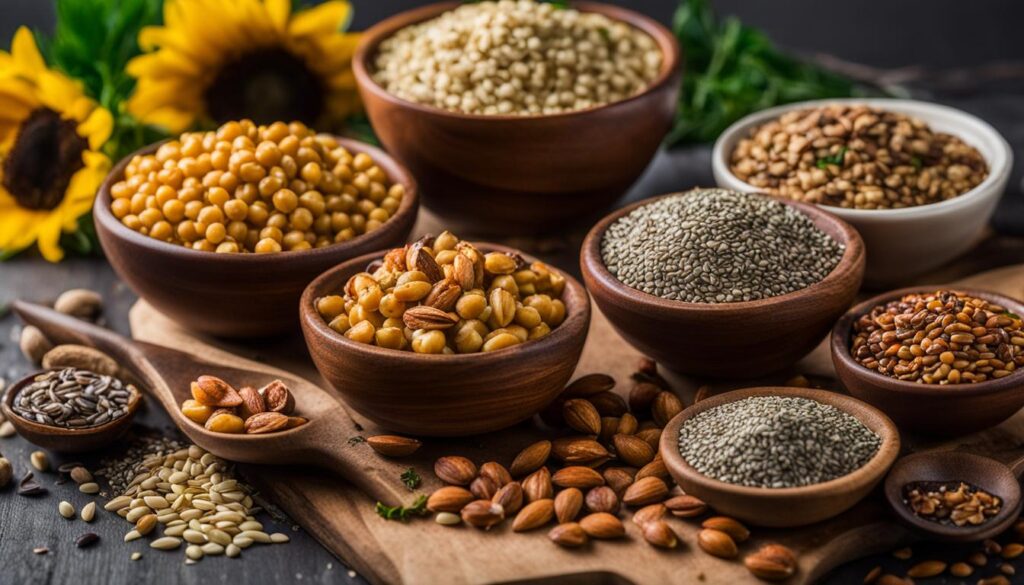
Green Warriors: High Protein Vegetables and Algae
Vegetables and algae are not just nutritious but also excellent sources of protein. In this section, we will explore the world of high protein vegetables and delve into the benefits of algae as a vegan protein source. Incorporating these plant-based protein options into your diet can provide you with the essential nutrients you need while supporting your health and wellness goals.
Discovering the Truth About Spirulina
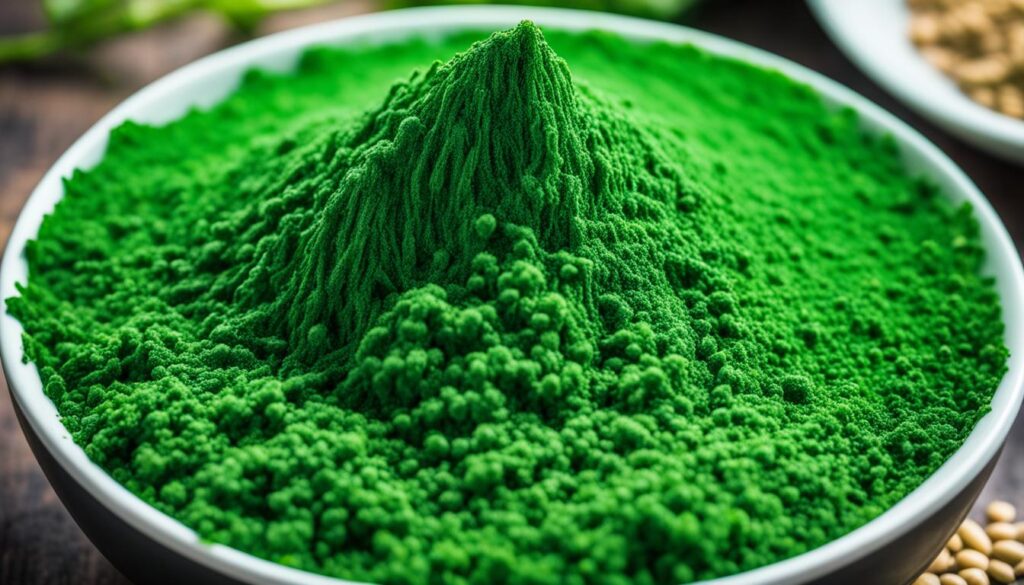
Spirulina is a type of algae that has gained popularity for its numerous health benefits, including its high protein content. This blue-green algae is rich in essential amino acids, making it a complete protein source. It is also packed with vitamins, minerals, and antioxidants, making it a superfood that supports overall health.
Adding spirulina to your diet is easy. You can mix it into smoothies, sprinkle it on top of salads, or incorporate it into energy bars and snacks. Its unique flavor adds a nutritious boost to various dishes, making it a versatile and convenient vegan protein option.
Leafy Greens: More Than Just Fiber
While leafy greens are often associated with fiber, they are also surprisingly high in protein. Vegetables such as broccoli, spinach, kale, and asparagus are not only packed with vitamins and minerals but also contain a significant amount of protein.
These high protein vegetables can be enjoyed in various ways. Cook them as a side dish, sauté them with other vegetables, or add them to salads and stir-fries. The versatility of leafy greens allows you to incorporate them into your meals effortlessly.
Including these nutrient-dense vegetables in your diet is a great way to boost your protein intake while enjoying the numerous health benefits they offer. So don’t hesitate to add them to your shopping list and explore the many delicious recipes that feature these green warriors.
Best High Protein Plant Based Foods
In this section, we will compile a list of the best high protein plant-based foods discussed in previous sections. These plant-based protein sources are perfect for those following a high protein plant-based diet, including vegetarians and vegans. Incorporating these foods into your meals can provide you with the protein you need to meet your nutritional requirements. Whether you’re looking to increase your protein intake or simply add variety to your diet, these plant-based protein sources are a valuable addition to your meal plan.
Here are some of the top plant-based protein sources:
Soy Products
Soy products such as tofu, tempeh, and edamame are rich in protein and offer a versatile base for many delicious dishes. They are suitable for various cooking methods and can be used to create flavorful and satisfying meals.
Beans
Beans, such as lentils and chickpeas, are not only high in protein but also provide a good amount of fiber. They can be combined with other ingredients to make hearty and nutritious meals, ranging from soups and stews to salads and burgers.
Nuts and Seeds
Nuts and seeds, including almonds, walnuts, chia seeds, and hemp seeds, are not only a great source of protein but also contain healthy fats and other essential nutrients. They can be enjoyed as snacks or added to various recipes, such as baked goods, smoothies, and salads.
Leafy Greens
Leafy greens such as spinach, kale, and broccoli are not only packed with vitamins and minerals but also provide a decent amount of protein. They can be incorporated into salads, stir-fries, smoothies, and other dishes, adding both taste and nutrition.
Quinoa
Quinoa is a complete protein source, meaning it contains all nine essential amino acids. It is a versatile grain that can be used as a base for salads, side dishes, and even desserts. It is a perfect choice for those following a high protein plant-based diet.
By incorporating these high protein plant-based foods into your diet, you can meet your protein needs while enjoying a variety of delicious and nutritious meals. Whether you’re following a vegetarian or vegan diet or simply looking to incorporate more plant-based protein sources, these options provide a valuable foundation for your meal planning.
Conclusion
In conclusion, adopting a diverse plant-based diet is crucial for ensuring adequate protein intake. Throughout this article, we have explored various high protein plant-based foods that are perfect for vegetarians and vegans. By incorporating these foods into your diet, you can reap the benefits of plant-based proteins and support your health and wellness goals.
Adopting a Diverse Plant-Based Diet for Protein
A diverse plant-based diet allows you to access a wide range of nutrients while meeting your protein needs. By consuming a variety of plant-based protein sources such as soy products, beans, nuts, seeds, and high protein vegetables, you can ensure that your body receives essential amino acids and other important nutrients.
How Plant-Based Proteins Support Overall Health
Plant-based proteins not only provide the necessary building blocks for muscle repair and growth but also offer additional health benefits. They are typically low in saturated fat and cholesterol, which can support heart health. Additionally, plant-based proteins are often rich in fiber, vitamins, minerals, and antioxidants, which contribute to overall well-being and may help prevent chronic diseases.
Incorporating high protein plant-based foods into your diet does not just benefit your protein intake; it also supports your overall health and helps create a more sustainable food system. By understanding the importance of plant-based proteins and making conscious choices, you can thrive on a high protein plant-based diet.

